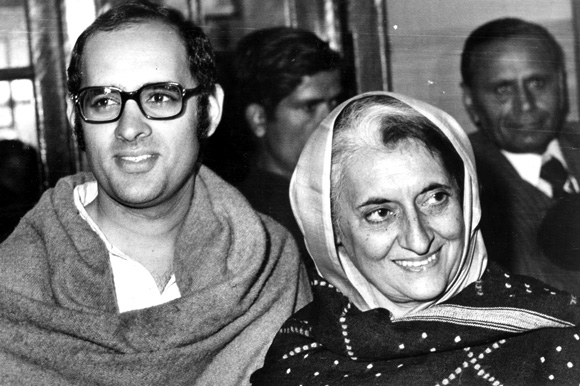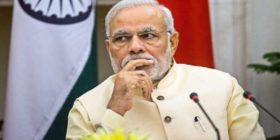‘To Sanjay Gandhi, the means were not as important as the end…’
‘The appeal that someone like Narendra Modi holds is precisely this — that he gets things done. Don’t ask too many questions about how he gets it done though…’
‘But that’s exactly what is dangerous because that is how authoritarianism comes in. It always comes in with public consent.’
Vinod Mehta, editor extraordinaire, speaks to Rediff.com‘s Saisuresh Sivaswamy in an eloquent interview.
Before Rahul Gandhi, there was his father Rajiv Gandhi. And before that, there was his younger brother Sanjay Gandhi, the one chosen to succeed Prime Minister Indira Gandhi, the one who ran riot during the Emergency imposed by her in 1975.
As a stunned country witnessed his shenanigans with sullenness and voted the mother-son duo out in 1977, journalistVinod Mehta, then editor of the girlie magazine Debonair, published a biography of the rising son.
Published by Jaico in 1978, The Sanjay Story got lost in the avalanche of quickie books on the Emergency.
“Mine is the only biography of him till date, all the others dealt with the Emergency,” Mehta, who retired last year as editor-in-chief of Outlook magazine, but remains an advisor to the magazine, pointed out in the course of a conversation withRediff.com‘s Saisuresh Sivaswamy in his New Delhi home.
Late last year, more than 30 years later, HarperCollins reissued the book, soon after Mehta’s memoir, Lucknow Boy, was published.
Vinod Mehta, arguably India’s finest magazine editor, recounts why he thinks Sanjay Gandhi is relevant today when everyone around seems to prefer a ‘strong leader.’.
Barring old fogies like us, does anyone even remember Sanjay Gandhi now?
Does the young generation even care to know? Does he matter anymore?
He is a forgotten figure.
I don’t think he matters today, but the Emergency (still) does — how easily it was achieved; how easily people fell in li#8800 how people of great integrity and character who you think would stand up against it… how easily they agreed.
I am talking here about people close to Mrs Gandhi, how Sanjay became their boss, etc.
He also matters in one other way, and I hope it is a false parallel… There is some yearning now in the country for a strong leader; somebody who gets things done.
Sanjay Gandhi’s charm, or appeal, at that time was precisely this — that he was able to get things done, that he cut through the red tape, that there were many processes and procedures which he was able to bypass.
For example, family planning or population control was high on the priority list of the country, but nobody had been able to do anything about it till Sanjay Gandhi came along with his strong-arm methods and compulsory sterilisation.
He got it done, like he got the slums cleared, the demolitions organised.
To him, the means were not as important as the end.
I think something like that is happening today.
The appeal that someone like Narendra Modi holds is precisely this — that he is a good administrator, he gets things done. Don’t ask too many questions about how he gets it done though.
But that’s exactly what is dangerous because that is how authoritarianism comes in. It always comes in with public consent.
Hitler was democratically elected. He used that mandate to slowly but surely suppress civil liberties, human rights, violate the constitution, etc.
So there’s a parallel there.
So, in that sense, is your book a warning?
Yeah, I think it’s a warning that a strong leader is… one has no objection to a strong leader, but you have to be strong within the Constitutional process.
Sanjay was called the extra-Constitutional authority.
It’s good if you can get things done and speed up governance. But you have to do it without saying the environmental law is useless.
You can’t say what’s the problem if 10,000 people are displaced from point A to point B because there’s so much mineral, so much bauxite or iron where they are right now.
When people say they want a strong leader, they are not very clear about what this means. They just want to see what he has achieved.
So a leader can say FDI has gone up by so much, so much more mineral wealth is being extracted from India, I have cleaned up so many slums. But what happened to the people in the slums? What happened to the people who were living on top of the mineral wealth?
Those questions also need to be answered.
That’s why people say ‘Oh well, just move the tribals who are there from point A to point B — what’s the problem?’ But we forget about their culture, their way of living that is dependent on the area where they have lived for thousands of years… their gods are over there…
Some people get upset that the Constitutional way of doing things takes too much time. We are always given the model of Singapore and China, of how they do these things in 24 hours.
There’s this great passion for something called single-window clearance, but what does it actually mean? It means that you go to one point and get all the clearances.
Somebody said if you want to get a proposal okayed in India, you have to go to 27 different ministries or something like that. I think people find that cumbersome and call it the bureaucratic problem.
Some of that bureaucratic delay can be removed. But many of those ways of doing things have some merit in them. They protect the rights of the disempowered, the poor.






Leave a reply